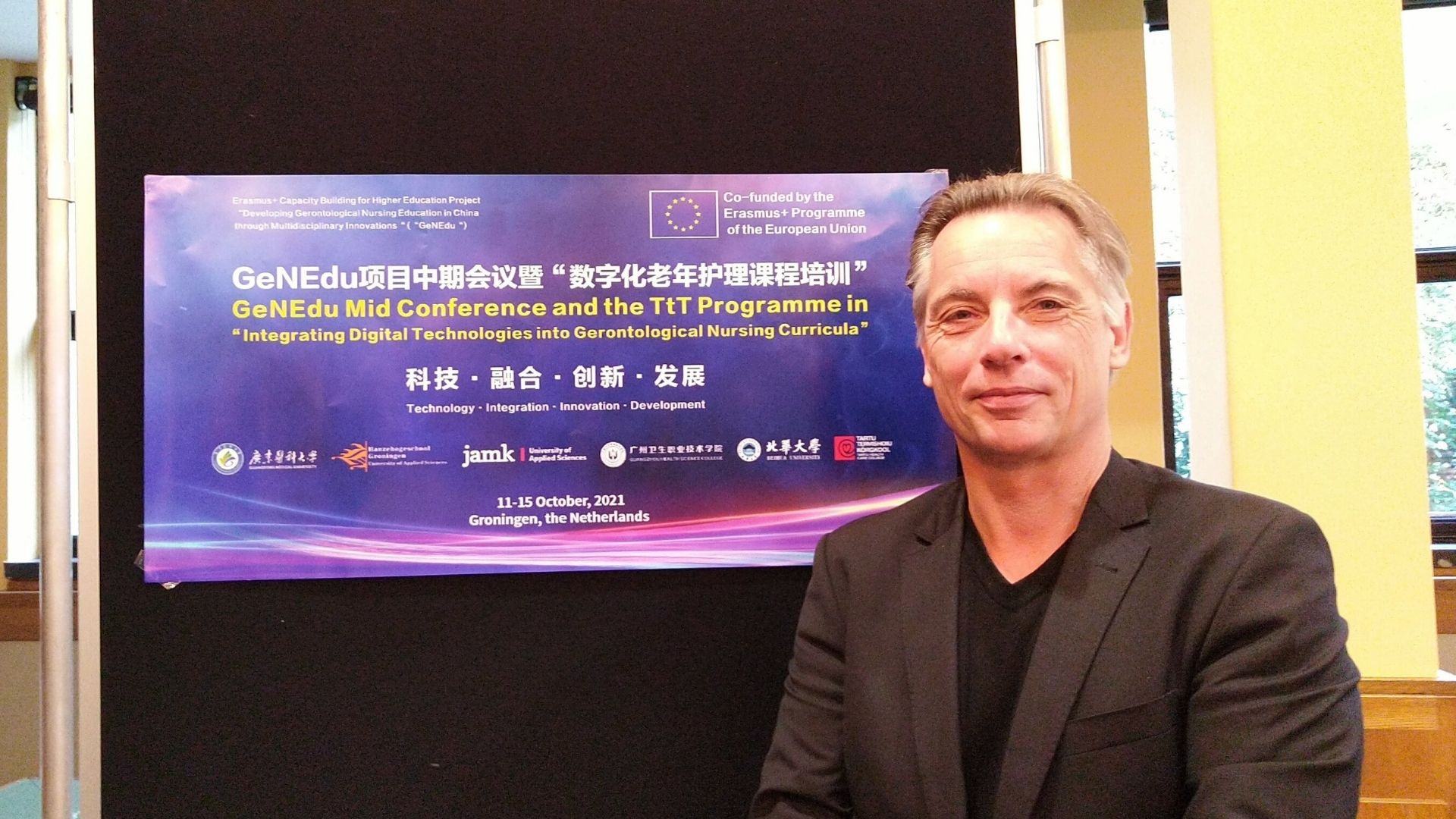A Letter to celebrate the moment of our mid conference

(Photo by Xiang He: Wolter Paans in front of the poster for GeNEdu Mid Conference. 11th Oct. 2021, HUAS, Groningen)
Dear colleagues, dear fellow project members, dear friends.
It is a great honour for me to address you at the hybrid-model conference: many of us this time are able to gather in an almost face-to-face manner, even though separately in four different locations. This is the first “real meeting” we have had after the Kick-off Seminar in Jyväskylä, Finland. It took us very long “journey” to get here, either travelling inside of Europe/China or presenting via online. A lot of appreciation!
Special thanks go to GDMU, Guangdong Medical University, for the hosting in China. Also, with gratitude is mentioned JAMK University of Applied Sciences for the preparation and organization of the midterm event. Tartu Health Care College, Estonia, Beihua University, and Guangzhou Health Science College: thanks a lot for your time and efforts and for participation.
Recently, it has been a difficult time for all of us. Certainly not only to make an interesting project a success, but also in a personal sense. Some have seen close relatives, friends, or colleagues become seriously ill or worse. Once again, it feels special to really meet each other in good health today. Once again, a pandemic reminds us that we are all particularly vulnerable and that we must take care of those who bear the most inconvenience and risk.
It is very meaningful and important that in such a situation we learn from each other to ensure a healthy and happy life for our beloved ones, and everyone around them. Moreover, to develop professional skills so that the entire international society ultimately benefits from our cooperation.
Despite the Covid obstacles, the project that brings us together now has started very energetically.
Everyone's involvement was – and still is – high from the start, and the commitment to the content was and still is unmistakably noticeable.
An important part of the funding of this project is to be able to meet each other to start a conversation and to gain an understanding of each other's situation and context so that there is not only cooperation in theory, but that the cooperation leads to demonstrable added value in society. An interesting Train-the-Train program has been scheduled next to the Mid Conference. We will have an opportunity to take an important step in the implementation of the project.
We will be working closely together in the coming months, and I express the hope that this project will not stop there. We can ask ourselves: “What are we going to achieve in the longer term? Who has it helped and what must we do to achieve all our goals as efficiently as possible? And what can we do to set new goals for the future?”
This project is not just about research, or about education, or about society; it is about how to connect that triangle, how to create the connecting links. Perhaps we shall even keep asking questions:
- What is good quality care for the elderly?
- What skills and competencies are needed?
- How can we support healthy aging?
- What is needed for improvements in health literacy?
- How do we practice ‘evidence-based’ nursing?
- How do we deliver accurate care coordination?
- And how all this can be taught based on a well-fitted nursing curriculum, and put into practice in a compassionate way?
All are key questions in this project.
In addition, one of the most valuable aspects of this project is that it is an inter-professional, trans-institutional and intercultural journey, which takes place with an open mind and in reciprocity.
Organizing knowledge exchange from which a substantial number of participants can benefit, and which is monitored in a result-oriented manner is not an easy task. It is a time-consuming job that costs energy and requires organizational talent. Nevertheless, a project can never be successful with coordinators and project leaders alone. It only makes sense if there is a positive dynamic between all those who commit to the content. As a trainer, as a teacher, as an innovator, as a student or as a professional.
For this reason, I also sincerely thank all those who promote sharing knowledge about the content, and, for instance, about which research methods are needed to prove that we are on the right track. Finally, I would like to express my gratitude to ourselves at the midterm of our project: we are the ones who have contributed and will continue to contribute.
Wolter Paans, Professor, Nursing Diagnostics, Hanze University of Applied Sciences